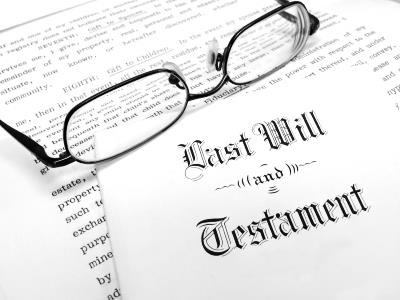PersonalFN's

Presents
How To Become Your Own Financial Planner?
An exclusive Program To Develop The Skills To Manage Your Personal Finance
We believe by signing up for the initiative, you too endeavour to develop the skills needed to understand the nuances of personal finance and be money-wise.
Module VI: All You Need To Know About Estate Planning
In this module, we'll attempt to take you through the nitty-gritties of sensible estate planning and address most of your concerns; so that you can plan the passing on of your hard earned assets to the people you desire either in a collaborative or confidential manner.
Session 17: Why Estate Planning Is Imperative For You

"... in this world nothing can be said to be certain, except death and taxes." -- Benjamin Franklin (a leading polymath, author, and politician)
Despite being aware about this inevitable fact, most people avoid thinking about estate planning.
Have you ever pondered...
What'll happen to the wealth you have created over years of hard work after your demise?
How will your family, loved ones be safeguarded after your demise?
Many would say: "Why do I need it so early in my life?"
As you know, life is uncertain; so the earlier you plan the better it is, rather being too optimistic.
If you die intestate (i.e. without preparing a Will), it can lead to various complications and disagreements amongst your loved ones and legal heirs. Hence, you should pragmatically and solemnly undertake estate planning.
Let's clarify that estate planning is not only for the wealthy, or those senior in age. The fact is: it's for everybody in today's world.
Estate planning in simple terms refers to the passing down of your assets/investment from one generation to another.
Estate planning is a dynamic process. It needs to be reviewed at regular intervals to account for any changes that may happen in your life or in the laws of the country.
Benefits of estate planning
-
 Estate planning ensures that your assets, both physical and financial, are bequeathed to the persons you want pass them on to, in a certain proportion, in your absence. You see, Law might not take into account your personal relationships or preferences while distributing your assets if you die intestate. Without proper planning, it is possible that the law disposes your estate among relatives who might not be your immediate choice of beneficiaries. So, you decide how much of your estate - be it property(s), car(s), personal accolades, financial investments, etc. - you want to pass on to whom and how, after your demise.
Estate planning ensures that your assets, both physical and financial, are bequeathed to the persons you want pass them on to, in a certain proportion, in your absence. You see, Law might not take into account your personal relationships or preferences while distributing your assets if you die intestate. Without proper planning, it is possible that the law disposes your estate among relatives who might not be your immediate choice of beneficiaries. So, you decide how much of your estate - be it property(s), car(s), personal accolades, financial investments, etc. - you want to pass on to whom and how, after your demise.
-

During your old age or sometimes even earlier in life, you may be incapacitated to think. Your loved ones / heirs may also face such a syndrome. Hence, if you engage in estate planning earlier, it can help you be prepared to handle such contingencies.
- If you wish your family, or loved ones live in peace and joy once you're gone, prudent estate planning is the answer. You don't need to wait till you own plenty of assets / investments, or till your retirement to do estate planning. It is advisable to prepare your Will early, once you have certainty about your asset and the legitimate heirs to whom you would like to pass on your wealth; and then in the due course, if need be, you can always revise it.
-

Those with ultra-high net worth and complex family structure can even form a Trust to pass on assets to beneficiaries. This way also you can decide how and when your beneficiaries should receive their heirloom. If your spouse and minor children are not well-versed in managing a large amount of wealth, creating a Trust can be useful.
-

Prudent estate planning can avoid the bickering, bitterness and the complications amongst your family member / loved ones. Thus, the financial, emotional and legal grief, that is usually encountered later, can be done away with.
Another event which is inevitable in our lives is tax payment. Estate planning if done smartly can also help you reduce the tax outgo. For instance, instead of passing on assets after your demise, you may gift them to your loved ones while you are alive; because if left to the prevailing intestacy rules, there are chances that you may end up paying a higher amount in taxes on your property and other assets. You can also make separate arrangements for tax payments. For example, you can provide for tax liabilities separately from your residuary estate, if you don't want to reduce the inheritance value of assets by way of taxes.
-
 Remember, a mere nomination for your investments and other assets is not enough. Nominees aren't necessarily your legal heirs. They are trustees of your assets; they don't always become the owner of your assets. The owner of the asset will be the legal heirs as per the Will or the Trust you've formed.
Remember, a mere nomination for your investments and other assets is not enough. Nominees aren't necessarily your legal heirs. They are trustees of your assets; they don't always become the owner of your assets. The owner of the asset will be the legal heirs as per the Will or the Trust you've formed.
You can even provide for, or address to your family member with a special need. You can go ahead and designate a guardian for them.
-
 Estate planning can help when you know where you stand today in terms of financial strength by writing down all your assets in black and white. It can serve as an opportunity to improve upon it during the remainder of your life span.
Estate planning can help when you know where you stand today in terms of financial strength by writing down all your assets in black and white. It can serve as an opportunity to improve upon it during the remainder of your life span.
Finally, here are a few...
Points to Remember
Estate Planning is a process of arranging and planning a person's succession and financial affairs.
The primary goal of estate planning is ensuring that the estate is passed on to your loved ones, the intended beneficiaries.
A prudently drawn estate plan can help minimise tax outgo and avoid squabbles, bitterness and legal battles amongst loved ones later.
Estate planning is needed irrespective of your age and economic strata. It is wise for everyone to begin the estate planning process as early as possible.
There are mainly two ways to go about estate planning: Will (which we'll talk in length in our ensuing lecture) and creating a Trust.
Remember, estate planning is a dynamic process. So don't forget to review/revisit your estate plan to account for changing conditions.
Thank You For Participating!
Disclaimer: This is for Private Circulation only and is not for sale. The content is only for information purposes and Quantum Information Services Private Limited (PersonalFN) is not providing any professional/investment advice through it. It does not constitute or is not intended to constitute an offer to buy or sell, or a solicitation to an offer to buy or sell financial products, units or securities. PersonalFN disclaims warranty of any kind, whether express or implied, as to any matter/content contained herein, including without limitation the implied warranties of merchantability and fitness for a particular purpose. PersonalFN and its subsidiaries / affiliates / sponsors / trustee or their officers, employees, personnel, directors will not be responsible for any direct/indirect loss or liability incurred by the user as a consequence of his or any other person on his behalf taking any investment decisions based on the content herein. It should be used at the user's own risk. The user must make his own investment decisions based on his specific investment objective and financial position and using such independent advisors as he believes necessary. PersonalFN does not warrant completeness or accuracy of any information published herein. All intellectual property rights emerging from this transcript content are and shall remain with PersonalFN. This is for your personal use and you shall not resell, copy, or redistribute this transcript, or use it for any commercial purpose. All names and situations depicted in the transcript content are purely fictional and serve the purpose of illustration only. Any resemblance between the illustrations and any persons living or dead is purely coincidental.